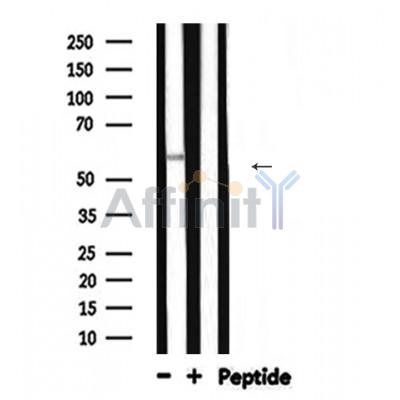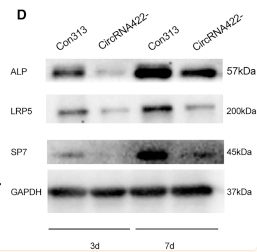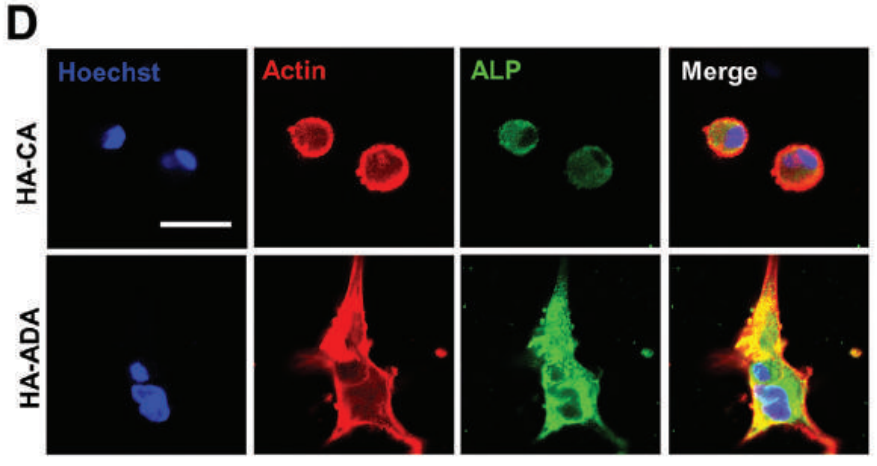Alkaline Phosphatase Antibody - #DF6225
| Product: | Alkaline Phosphatase Antibody |
| Catalog: | DF6225 |
| Description: | Rabbit polyclonal antibody to Alkaline Phosphatase |
| Application: | WB IHC IF/ICC |
| Cited expt.: | WB, IHC, IF/ICC |
| Reactivity: | Human, Mouse, Rat |
| Prediction: | Pig, Bovine, Horse, Sheep, Rabbit, Dog |
| Mol.Wt.: | 57kDa; 57kD(Calculated). |
| Uniprot: | P05186 |
| RRID: | AB_2838191 |
Product Info
*The optimal dilutions should be determined by the end user. For optimal experimental results, antibody reuse is not recommended.
*Tips:
WB: For western blot detection of denatured protein samples. IHC: For immunohistochemical detection of paraffin sections (IHC-p) or frozen sections (IHC-f) of tissue samples. IF/ICC: For immunofluorescence detection of cell samples. ELISA(peptide): For ELISA detection of antigenic peptide.
Cite Format: Affinity Biosciences Cat# DF6225, RRID:AB_2838191.
Fold/Unfold
AKP2; Alkaline phosphatase liver/bone/kidney; Alkaline phosphatase liver/bone/kidney isozyme; Alkaline phosphatase tissue nonspecific isozyme; Alkaline phosphatase, tissue-nonspecific isozyme; Alkaline phosphomonoesterase; Alpl; AP TNAP; AP-TNAP; APTNAP; BAP; FLJ40094; FLJ93059; Glycerophosphatase; HOPS; Liver/bone/kidney type alkaline phosphatase; MGC161443; MGC167935; PHOA; PPBT_HUMAN; Tissue non specific alkaline phosphatase; Tissue nonspecific ALP; TNAP; TNSALP;
Immunogens
A synthesized peptide derived from human ALPL, corresponding to a region within the internal amino acids.
- P05186 PPBT_HUMAN:
- Protein BLAST With
- NCBI/
- ExPASy/
- Uniprot
MISPFLVLAIGTCLTNSLVPEKEKDPKYWRDQAQETLKYALELQKLNTNVAKNVIMFLGDGMGVSTVTAARILKGQLHHNPGEETRLEMDKFPFVALSKTYNTNAQVPDSAGTATAYLCGVKANEGTVGVSAATERSRCNTTQGNEVTSILRWAKDAGKSVGIVTTTRVNHATPSAAYAHSADRDWYSDNEMPPEALSQGCKDIAYQLMHNIRDIDVIMGGGRKYMYPKNKTDVEYESDEKARGTRLDGLDLVDTWKSFKPRYKHSHFIWNRTELLTLDPHNVDYLLGLFEPGDMQYELNRNNVTDPSLSEMVVVAIQILRKNPKGFFLLVEGGRIDHGHHEGKAKQALHEAVEMDRAIGQAGSLTSSEDTLTVVTADHSHVFTFGGYTPRGNSIFGLAPMLSDTDKKPFTAILYGNGPGYKVVGGERENVSMVDYAHNNYQAQSAVPLRHETHGGEDVAVFSKGPMAHLLHGVHEQNYVPHVMAYAACIGANLGHCAPASSAGSLAAGPLLLALALYPLSVLF
Predictions
Score>80(red) has high confidence and is suggested to be used for WB detection. *The prediction model is mainly based on the alignment of immunogen sequences, the results are for reference only, not as the basis of quality assurance.
High(score>80) Medium(80>score>50) Low(score<50) No confidence
Research Backgrounds
This isozyme plays a key role in skeletal mineralization by regulating levels of diphosphate (PPi).
N-glycosylated.
Cell membrane>Lipid-anchor.
Belongs to the alkaline phosphatase family.
Research Fields
· Metabolism > Metabolism of cofactors and vitamins > Thiamine metabolism.
· Metabolism > Metabolism of cofactors and vitamins > Folate biosynthesis.
· Metabolism > Global and overview maps > Metabolic pathways.
References
Application: IF/ICC Species: Human Sample: hMSCs
Application: IHC Species: human Sample:
Application: IF/ICC Species: human Sample:
Application: WB Species: Rat Sample:
Application: WB Species: Rat Sample: BMSCs
Restrictive clause
Affinity Biosciences tests all products strictly. Citations are provided as a resource for additional applications that have not been validated by Affinity Biosciences. Please choose the appropriate format for each application and consult Materials and Methods sections for additional details about the use of any product in these publications.
For Research Use Only.
Not for use in diagnostic or therapeutic procedures. Not for resale. Not for distribution without written consent. Affinity Biosciences will not be held responsible for patent infringement or other violations that may occur with the use of our products. Affinity Biosciences, Affinity Biosciences Logo and all other trademarks are the property of Affinity Biosciences LTD.


















